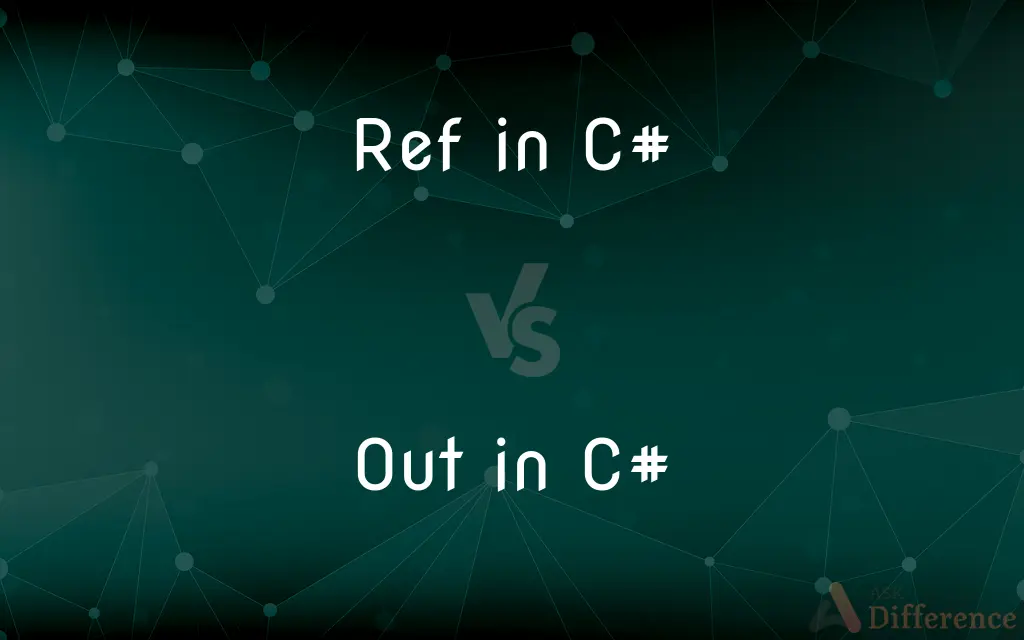Ref in C# vs. Out in C# — What's the Difference?
By Tayyaba Rehman & Fiza Rafique — Published on January 31, 2024
Ref in C# allows modification of arguments and requires initialization before passing. Out in C# similar to ref, but used for returning additional values and doesn't require initialization.

Difference Between Ref in C# and Out in C#
Table of Contents
ADVERTISEMENT
Key Differences
Ref in C# is used when a method needs to modify a variable passed as an argument. It requires the variable to be initialized before passing to the method. Conversely, Out in C# is also used for modifying variables, but it is specifically designed for methods that need to return more than one value, and it does not require the variable to be initialized before passing.
When using Ref in C#, the value of the variable is carried into the method, allowing for two-way data transfer. In contrast, Out in C# is intended for one-way data transfer, primarily from the method to the caller, as it doesn't take the variable's initial value into consideration.
Ref in C# can be seen as a way to explicitly specify that a variable is meant to be modified by the method. It demands careful handling as the initial value is considered. On the other hand, Out in C# signals that the method will assign a value to the variable, making it suitable for scenarios where the initial value of the variable is irrelevant.
Error handling differs slightly between the two. In Ref in C#, since the variable is initialized, there's a lower risk of working with undefined data. However, with Out in C#, the method must assign a value before it returns, which can be a source of errors if overlooked.
The choice between Ref and Out in C# depends on the specific requirements of the method and the desired flow of data. Ref is preferable when the existing data of the variable is as important as the output, whereas Out is ideal when the method's purpose is to output values without concern for the variable's initial state.
ADVERTISEMENT
Comparison Chart
Initialization Requirement
Requires variables to be initialized before passing
Does not require initialization before passing
Data Flow
Two-way (method can read and modify the variable)
One-way (primarily for method to output values)
Use Case
When a method modifies an existing variable
When a method needs to return additional values
Error Handling
Lower risk of undefined data
Must assign a value before the method returns
Suitability
Preferred when initial value of variable is important
Suitable when initial value is irrelevant
Compare with Definitions
Ref in C#
Ref in C# demands variables to be initialized before being passed.
Int count = 5; Increment(ref count);
Out in C#
Out in C# is used for methods that focus on outputting values.
Void Divide(int a, int b, out int result) { result = a / b; }
Ref in C#
Ref in C# is a keyword used to pass arguments by reference.
Void UpdateValue(ref int number) { number = 10; }
Out in C#
Out in C# is a keyword for returning additional values from a method.
Bool TryParse(string s, out int result) { return int.TryParse(s, out result); }
Ref in C#
Ref in C# is used for modifying variables within methods.
Void Swap(ref int a, ref int b) { int temp = a; a = b; b = temp; }
Out in C#
Out in C# allows a method to initialize a variable.
Void GetSize(out int width, out int height) { width = 1024; height = 768; }
Ref in C#
Ref in C# allows a method to modify the value of the passed variable.
Void Square(ref int x) { x *= x; }
Out in C#
Out in C# does not require variables to be initialized before passing.
Int number; GetNumber(out number);
Ref in C#
Ref in C# enables two-way communication between a method and its caller.
Void GetCoordinates(ref int x, ref int y) { x = 1; y = 2; }
Out in C#
Out in C# is ideal for returning multiple values from a single method.
Void GetStats(out int min, out int max) { min = 1; max = 100; }
Common Curiosities
What does Ref in C# do?
It passes an argument by reference, allowing modification within the method.
Are Out parameters in C# always assigned within the method?
Yes, methods using Out must assign a value to them before returning.
Can a method have both Ref and Out parameters in C#?
Yes, a method can have both Ref and Out parameters.
Is Ref in C# suitable for methods that only output values?
No, Out in C# is more suitable for methods that solely output values.
What happens if an Out parameter is not assigned in a method?
The C# compiler will throw an error if an Out parameter is not assigned.
Do I need to initialize a variable before passing it with Ref in C#?
Yes, variables must be initialized before being passed with Ref.
Can Ref and Out be used with value types in C#?
Yes, they can be used with both value and reference types.
Is initialization required for Out in C# parameters?
No, Out parameters do not need to be initialized before use.
Can Ref in C# be used for output purposes?
Yes, it can be used to modify and return a value through a method parameter.
Does using Ref in C# affect performance?
Using Ref may have a minimal impact on performance due to reference passing.
Can Ref in C# be used for multiple return values?
It can, but Out is typically more straightforward for multiple return values.
Is it mandatory to use the Out keyword when calling a method?
Yes, when a method defines Out parameters, you must use the Out keyword when calling.
How does Out in C# differ from return statements?
Out can return multiple values, while return statements can only return one.
Does Ref in C# pass the actual variable or a copy?
It passes the actual variable, not a copy.
Is it possible to use Out for input purposes?
No, Out is intended for output purposes only.
Share Your Discovery

Previous Comparison
One-Dimensional Array vs. Two-Dimensional Array
Next Comparison
Proxy War vs. Cold WarAuthor Spotlight
Written by
Tayyaba RehmanTayyaba Rehman is a distinguished writer, currently serving as a primary contributor to askdifference.com. As a researcher in semantics and etymology, Tayyaba's passion for the complexity of languages and their distinctions has found a perfect home on the platform. Tayyaba delves into the intricacies of language, distinguishing between commonly confused words and phrases, thereby providing clarity for readers worldwide.
Co-written by
Fiza RafiqueFiza Rafique is a skilled content writer at AskDifference.com, where she meticulously refines and enhances written pieces. Drawing from her vast editorial expertise, Fiza ensures clarity, accuracy, and precision in every article. Passionate about language, she continually seeks to elevate the quality of content for readers worldwide.
















































